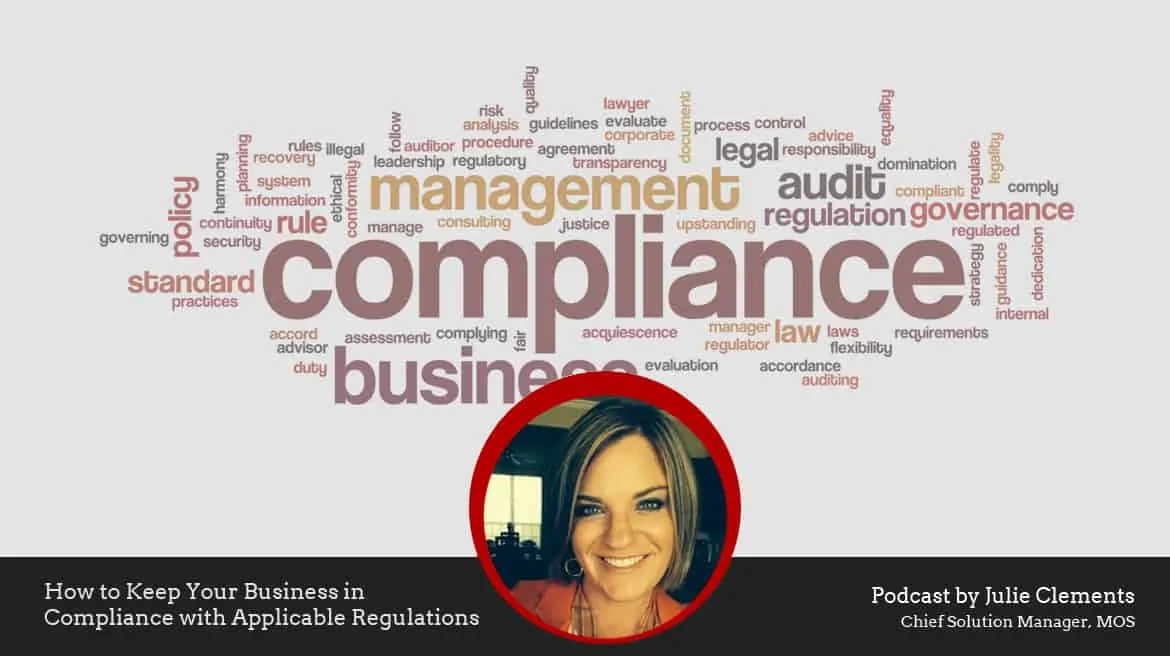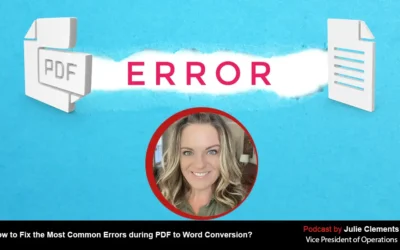A leading outsourcing company based in Tulsa, Oklahoma, Managed Outsource Solutions (MOS) is experienced in providing innovative, cost-effective outsourcing solutions for clients in several industries – education, health care, legal, information technology and more.
In today’s podcast, Julie Clements, the Chief Solutions Officer with MOS discusses how to keep your business in compliance with standard regulations, which is crucial to attain better growth rate.
Read Transcript
Some of the Effects of the Regulatory Compliance Breach
It is kind of difficult to measure the impact of a compliance breach. Fines are meant to be a deterrent and a punishment that can have a major impact on the business’s bottom line. In the healthcare sector, HIPAA violations can carry severe financial penalties. Category 1 violation carries a minimum of a $100 up to 50,000, and Category 4 violation carries $50,000 up to a ceiling at $1.5 million. The largest fine ever imposed for an environmental violation was $18.7 billion. This was on a BP for the 2010 Deepwater Horizon spill. In the post-Enron era, the governments of North America and Europe have taken measures to prevent future corruption and only a thorough knowledge of all relevant regulations and penalties involved will ensure that your business is safe in the future.
A Few Tips to Keep Your Business in Compliance
Know your tax rules. When you run a business, there are many things you have to remember such as tax codes, rules, and regulations that can be confusing. It is important to update yourself and adhere to tax codes. Tax code non-compliance can have a negative impact on your business, and it can also put you behind bars. So it’s super important to understand tax codes, and be both federal and state compliant.
Have a periodic compliance audit. It is important to have a periodic compliance audit within the company. Regular audits will help identify the anomalies and remain in compliance. There are many aspects in running business operations and all the areas should be in compliance. With the help of a good compliance management team, all business requirements can be satisfied and this also helps to save time and money.
Understand human resource rules and policies. All businesses should follow necessary policies governing the human resource. It is mandatory for businesses to have a strong and actionable sexual harassment policy. All employees must be trained, and make them sign the policy to prevent a legal action later. There are various other rules that oversee human resource policy such as work benefits compensation plan, pension policy etc.
Another thing is to educate your employees. No matter how big or small your company is, all your employees must be trained on the compliance requirements. A minor mistake from any of the employees can lead you to legal troubles. So training your employees means you can escape from legal challenges easily.
And then, keep your compliance documents safe. All important documents such as invoices, contracts, anything else related to the compliance process must be kept safely. Important data can be converted into digital format with help of data conversion services and thereby ensure that no data is lost. The right data or information can exonerate you from a full-blown legal crisis.
Also important is to create a checklist. You can learn about all the necessary requirements to maintain business compliance both on your state’s small business administration site and the United States Small Business Administration site. Prepare a checklist, including the timelines and the required paperwork, so that you can meet the various requirements.
Keep virtual copies of all paperwork and receipts. Make sure that you accurately label all your digital records and stay very organized. Maintain all your receipts. The IRS typically requires only receipts for business equipment of $75 or more, but it is better to keep all the receipts to prove business expenses in case you do have to face an IRS tax audit.
Reveal any potential conflicts of interest. Partnerships, corporations, and LLCs are committed to higher standards of disclosure than sole proprietorships. Business owners must disclose potential conflicts of interest to other entities involved in running the business. Maintaining this in writing will help to have a record. Having a conflict of interest need not prevent you from engaging in a particular activity, if other state laws don’t apply.
So, staying in compliance needs not to be viewed as something harassing and burdensome, but it can be used effectively to actually help the business. You may have to compile a whole lot of information and analyses to meet regulatory needs, but it can be used to serve your own company’s purpose to refine and enhance your operations. These insights gathered can be used to design solutions for problems perceived. The technological innovations you add to help with regulatory compliance can be used to provide better business outcomes. For instance, technology you use for regulatory data collection, maintenance and reporting can be used to improve your data accuracy, and provide an improved customer experience and faster speed to market. What companies need to do is to identify how a compliance program can both preserve and create value because this will transform the compliance program into a valuable investment in your business’s future.
If you would like to learn a little bit more, please visit our website at https://www.managedoutsource.com.
Thanks for your time!




